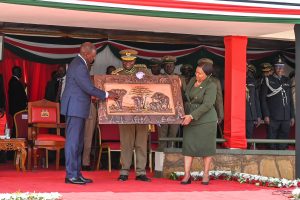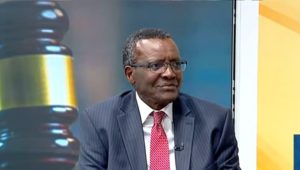A court has raised the bar high for individuals seeking to challenge public appointments on the grounds of nepotism and bias from the officer or appointing authority.
The High Court, in a landmark ruling in the case challenging the appointment of IEBC chiefs, declared that familial ties to political figures alone cannot disqualify a nominee from public office.
Such arguments will not be tolerated unless there is concrete evidence of undue influence or procedural irregularities.
The judgment, delivered in respect of the matter of nominating Hassan Noor as a commissioner of the Independent Electoral and Boundaries Commission, reaffirmed the constitutional principles of merit, fairness and transparency.
Claims of bias were also raised against IEBC chairman Edung Ethekon on assertions he had worked with State House deputy chief of staff Josphat Nanok when the latter was governor of Turkana county.
The three-judge bench of Justices John Chigiti, Roselyn Aburili and Bahati Mwamuye cautioned against blanket disqualifications based on associations between an officer due for appointment and a state officer.
The petitioners had argued that Noor’s admission of being the brother-in-law of Suna East MP Junet Mohamed, the minority leader in the National Assembly, made them apprehensive he would be biased, thus undermining the independence of the IEBC.
They contended that the relationship cast doubt on whether the commission’s selection panel acted in good faith when it included his name in the shortlist.
However, the court ruled that while public appointments must adhere to strict ethical standards, familial connections, without proof of improper influence, cannot invalidate a qualified candidate’s nomination.
Central to the court’s reasoning in the case, which ended the recruitment deadlock allowing IEBC chiefs to assume office, was the constitutional framework governing public appointments.
Articles 10, 27, 73 and 232 of the constitution demand that state offices be filled based on integrity, competence and merit and that the hiring be free from discrimination or favouritism.
The Leadership and Integrity Act further reinforces the constitutional principles, requiring transparency and accountability in appointments.
However, the court emphasised that the constitution does not impose an outright ban on individuals related to politicians from serving in public office.
The judges argued that imposing a ban based on perceptions could violate the right to equal opportunity.
“Public trust demands that decisions be made objectively and in the public interest,” the court held. “However, perception alone, if not grounded in fact, cannot be elevated to a constitutional disqualification,” the ruling reads.
The judges cited the Court of Appeal’s decision in a case Jimi Wanjigi filed alleging bias on the part of Wafula Chebukati [deceased] after he was named IEBC boss.
At that time, the claimants alleged his history with the ODM party – Chebukati unsuccessfully ran for MP under the party.
But the judges reiterated that the test for bias must be based on whether a reasonable and informed person, aware of all relevant circumstances, would perceive a real likelihood of partiality, not just suspicion.
The ruling also referenced a case where the Court of Appeal held that family members of public officials, including judges, are entitled to pursue independent careers without their relations automatically casting doubt on institutional impartiality.
“To suggest otherwise would impose an unreasonable burden on qualified individuals,” the judges observed.
They restated that only demonstrable conflicts of interest, not speculative ones, should warrant disqualification.
The court noted that the petitioners had not challenged Noor’s professional qualifications or integrity.
It also held that the claimants had not provided evidence that their relationship with Junet influenced his nomination.
On the part of Ethekon, the court said, “To disqualify a nominee solely based on prior professional engagement with a political figure, without more, would amount to setting a precedent that unfairly excludes competent and experienced public officers and individuals from national service.”
The decision has significant implications for future appointments, clarifying that allegations of nepotism or bias must be substantiated with proof of actual compromise rather than inferred from associations.
Pundits hold that the decision reinforces due process while discouraging politically motivated challenges.
Petitioners, unless the same is challenged, have the heavier burden to prove misconduct.
Members of the action groups argue that the precedent potentially makes it harder to scrutinise appointments where conflicts of interest may be subtle.
by MOSES OGADA












